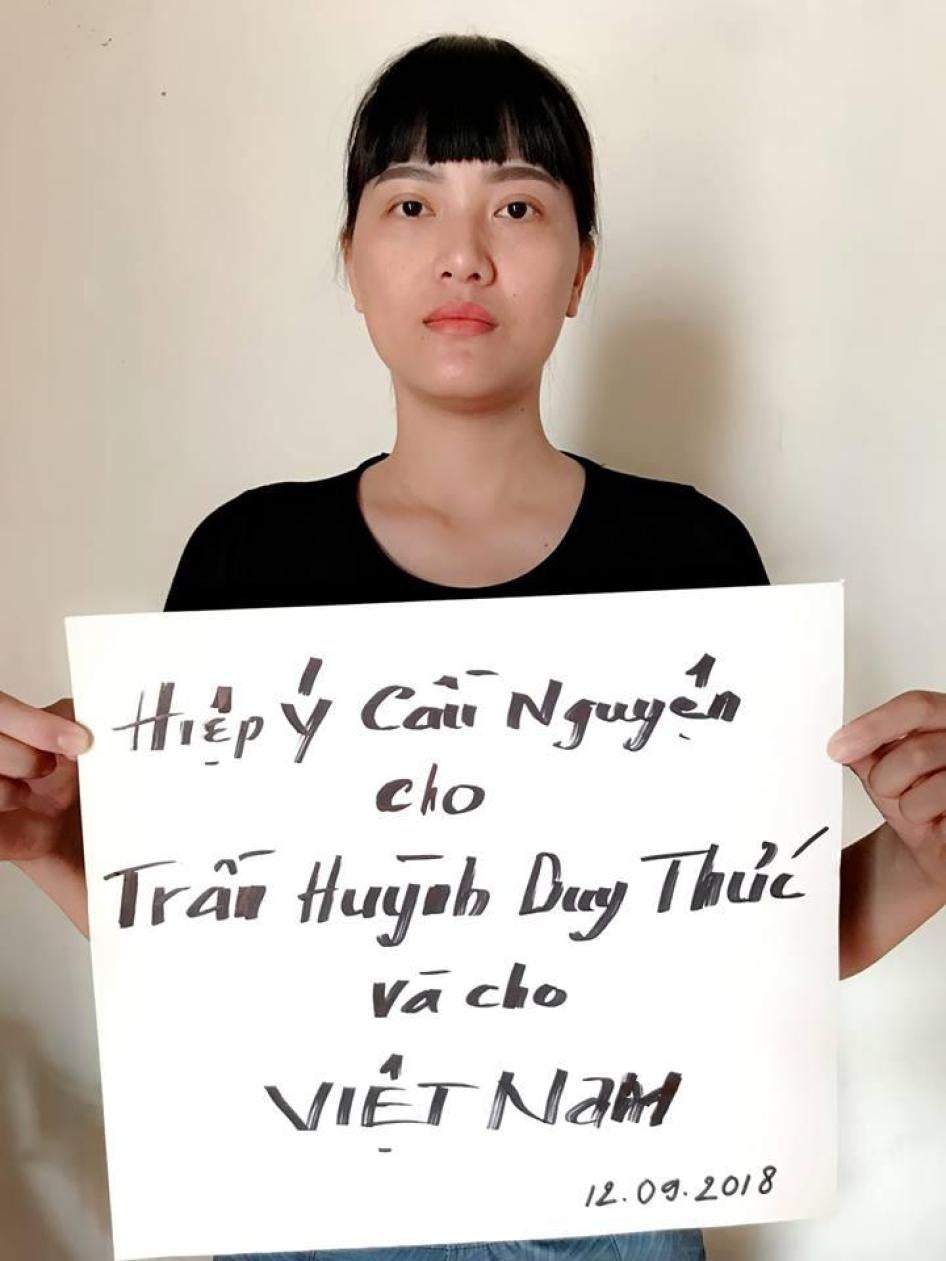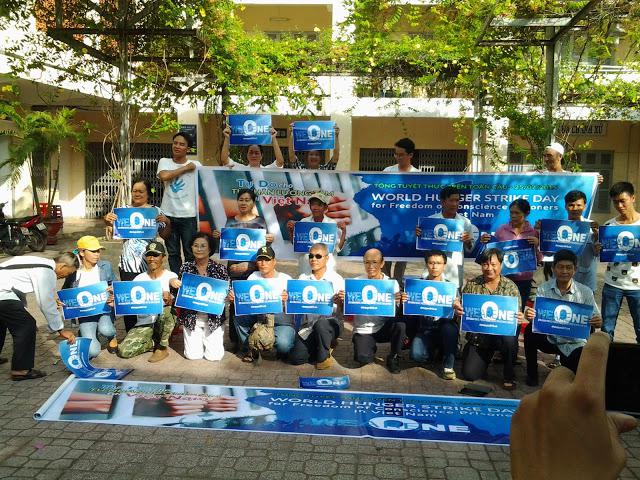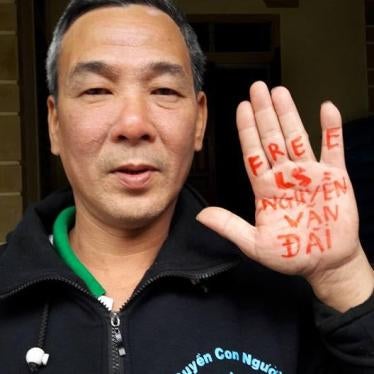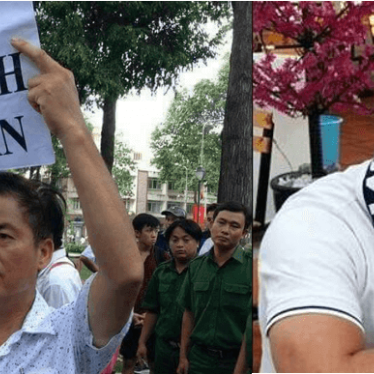(New York) – Vietnam should drop all charges against human rights campaigner Huynh Thuc Vy, who faces trial under article 276 of the 1999 penal code for allegedly disrespecting the national flag, Human Rights Watch said today. She faces up to three years imprisonment if convicted by the People’s Court of Buon Ho town, Dak Lak province at trial on November 22.
“For years, Vietnam has sought any excuse to punish Huynh Thuc Vy for her tireless advocacy of human rights and democracy, and in their desperation the authorities have now latched on to the splattering of a flag with white paint,” said Phil Robertson, deputy Asia director. “It is wrong to put protecting a national symbol first over protecting the rights of the nation’s people.”
The day before the country’s National Day in September 2017, Huynh protested against the government by splashing white paint on the national flag. She wrote on Facebook, “The Nation is bottom-deep in debt! There’s nothing to celebrate for. Formosa; Complete contamination; Cancer; Fake Medicine; Prisoners of Conscience; Human Rights Violations; About to Lose Our Country… I protest against celebrations by painting the red flag white.”
Vietnam, like many other countries, has made flag desecration a crime. Article 276 of the Criminal Code states “Those who deliberately offend the national flag, or the national emblem shall be subject to warning, non-custodial reform for up to three years or a prison term of between six months and three years.” In August 2018, the authorities of Buon Ho town initiated a case against Huynh under article 276 for “disrespecting the national flag” and ordered her not to leave her residential area pending further investigation of the charge. In October, the police sent her case for prosecution.
The police of Dak Lak accused her of “linking with bad elements from outside the country; exchanging ideas, giving interviews, writing articles, making video clips, and distributing them on her blog and on social media with contents that distort and twist the truth of Vietnam, smear and malign our Party and State.”
Huynh, 33, is a political blogger whose writing has spread extensively on the internet. Her father, Huynh Ngoc Tuan, served 10 years in prison between 1992-2002 for attempting to send a novella and several short stories critical of government policies to overseas audiences. Due to her father’s status as a political prisoner, Huynh and her family suffered from harassment, intimidation, and politically motivated discrimination by the authorities during her childhood.
She began publishing articles online in late 2008. Touching upon various social and political issues, her writing promotes a multi-party political system, freedom, and respect for human rights. She also urges young people to become socially and politically engaged. She regularly writes in support of activists who have been imprisoned for their peaceful activism. In 2015, a collection of her writings, Identifying the Truth, Freedom & Human Rights, was published abroad.
In May 2011, commenting on the non-democratic national election in Vietnam, in which the ruling communist party determines who can run for office, Huynh wrote:
In Vietnam, one has to vote whether one wants to or not. Who you vote for is not important. It does not affect or change any national matter, whether big or small. It also has nothing to do with the life of any particular community of normal people… To remain silent before such absurdity is to agree with such absurdity. It means a lack of responsibility to oneself and to society and the country. We must choose for ourselves a progressive society in which the right to vote and the right to run for an election must be carried out in a meaningful, democratic, and just manner.
In December 2011, the People’s Committee of Quang Nam province decided to administratively issue a fine to the Huynh family total of 270,000,000VND (approximately US$13,500 at the time) for using information technology to spread what the government termed “propaganda” against the Socialist Republic of Vietnam.
In 2012, Huynh received a Hellman-Hammett award, given to writers who suffered persecution, along with her father Huynh Ngoc Tuan. In December 2012, the police at Tan Son Nhat airport in Ho Chi Minh city prohibited Vy’s brother Huynh Trong Hieu from traveling to the United States to receive the Hellman-Hammett awards given to his father and his sister, and confiscated his passport. Authorities said they acted on request from the police of Quang Nam province where the Huynh family resided at the time.
Huynh participated in public protests against Vietnam’s proposed special economic zone law and the problematic cyber security law. She campaigned against the loss of rights and livelihoods caused by Formosa, a Taiwan-owned steel company that dumped toxic waste into the ocean off Vietnam’s central coast in April 2016, causing a massive environmental disaster.
She continuously advocated for an end to police’s excessive use of force, and violence and torture in detention. She voiced demands for authorities to end harassment and surveillance, and immediately release political prisoners including Tran Huynh Duy Thuc, Tran Thi Nga, Le Dinh Luong, and many others. She also worked to research the plight of lesser known Montagnard activists and raise awareness about government persecution of freedom of religion and belief in the Central Highlands.
Huynh and her family have suffered years of harassment and abuse at the hands of authorities because of their political activism. For example, in December 2013, a group of unidentified men assaulted her father Huynh Ngoc Tuan when he was campaigning to form an association of former prisoners of conscience (Hoi Cuu Tu nhan Luong tam). In February 2014, unidentified thugs threw rocks into their house in the town of Tam Ky, Quang Nam province. In July 2015, police at Tan Son Nhat airport prohibited Huynh from leaving Vietnam for Bangkok to attend a training course organized by Reporters Without Borders. The police also confiscated her passport at that time and told her they acted on an order from the Quang Nam provincial police.
In November 2013, Huynh and fellow activists launched a group called Vietnamese Women for Human Rights. The group aims to “enhance individual awareness about human dignities and her basic rights as well as others’, in order to advocate for a society which respects human rights.”
Tran Thi Nga, a co-founder and executive member of the group, is currently serving a 9-year prison sentence for “conducting propaganda against the State.” In October, Tran’s husband Phan Van Phong expressed grave concern for her health and life in prison because she received threats made by other prisoners that prison guards refused to act to stop. Prison guards denied Tran Thi Nga’s family the right to visit her in August and September 2018 because they claimed she was “not obeying prison rules.”
“Sending Huynh Thuc Vy to court and ultimately prison shows just how desperate Vietnam is to shut down activists in order to limit their influence on society and politics,” Robertson said. “The EU and other foreign donors and trade partners should call out Vietnam and demand it fulfill its promises to improve its abysmal rights record if it wants closer political and economic relations.”











